It’s Good to Be King
Apparently, Charles III is quite well off.
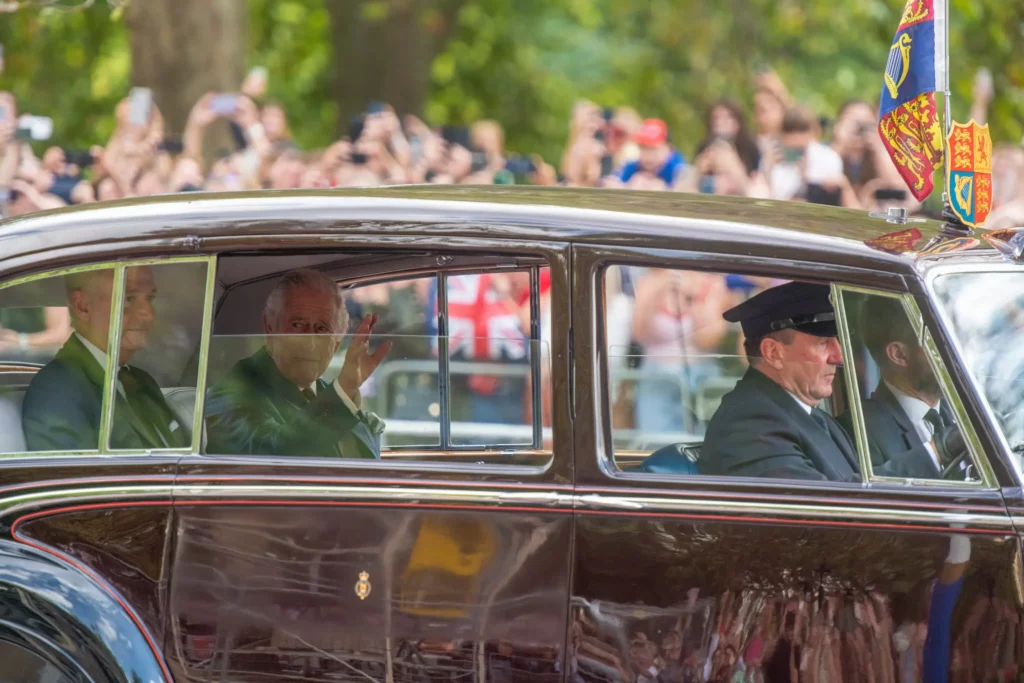
Jane Bradley and Euan Ward, two London-based reporters for NYT, seem to be going for an exposé with their page 1 report “King Charles Inherits Untold Riches, and Passes Off His Own Empire.” I found nothing in it terribly shocking.
King Charles III built his own empire long before he inherited his mother’s.
Charles, who formally acceded to the British throne on Saturday, spent half a century turning his royal estate into a billion-dollar portfolio and one of the most lucrative moneymakers in the royal family business.
While his mother, Queen Elizabeth II, largely delegated responsibility for her portfolio, Charles was far more deeply involved in developing the private estate known as the Duchy of Cornwall. Over the past decade, he has assembled a large team of professional managers who increased his portfolio’s value and profits by about 50 percent.
Today, the Duchy of Cornwall owns the landmark cricket ground known as The Oval, lush farmland in the south of England, seaside vacation rentals, office space in London and a suburban supermarket depot. (A duchy is a territory traditionally governed by a duke or duchess.) The 130,000-acre real estate portfolio is nearly the size of Chicago and generates millions of dollars a year in rental income.
The conglomerate’s holdings are valued at roughly $1.4 billion, compared with around $949 million in the late queen’s private portfolio. These two estates represent a small fraction of the royal family’s estimated $28 billion fortune. On top of that, the family has personal wealth that remains a closely guarded secret.
This strikes me as both the historical essence of royalty and a logical modern extension of it. That is, those born into high station in such systems inherit substantial assets, mostly in the form of land, other real estate, artwork, and antiquities. And, in an age where the royal family is essentially a tourist attraction and the public looks askance at funding their highfalutin lifestyle out of tax coffers, they need to be more self-sustaining.
As king, Charles will take over his mother’s portfolio and inherit a share of this untold personal fortune. While British citizens normally pay around 40 percent inheritance tax, King Charles gets this tax free. And he will pass control of his duchy to his elder son, William, to develop further without having to pay corporate taxes.
Historically, high royals were above the law. It surprises me not in the least that the crown does not pay inheritance taxes. Indeed, doing so would soon leave them no longer royals. Even if we started today, the crown would be worth 60 percent less than it was last week. Absent the ability to invest that, Charles would pass 60 percent of that 60 percent to William. To be sure, the Windsors still wouldn’t be paupers. But that’s just not how royalty works.
The growth in the royal family’s coffers and King Charles’s personal wealth over the past decade came at a time when Britain faced deep austerity budget cuts. Poverty levels soared, and the use of food banks almost doubled. His lifestyle of palaces and polo has long fueled accusations that he is out of touch with ordinary people. And he has at times been the unwitting symbol of that disconnect — such as when his limo was mobbed by students protesting rising tuition in 2010 or when he perched atop a golden throne in his royal finery this year to pledge help for struggling families.
Today, he ascends to the throne as the country buckles under a cost-of-living crisis that is expected to see poverty get even worse. A more divisive figure than his mother, King Charles is likely to give fresh energy to those questioning the relevance of a royal family at a time of public hardship.
The mythology of the constitutional monarchy is that it serves as a rallying symbol for the country. The people want their royals to live fabulously as a symbol of the grandeur of the UK. In reality, one imagines a lot of them resent the hell out of it.
More practically, as noted earlier, the House of Windsor is a tourist attraction and a lucrative one. Whether it justifies quite this level of excess is, of course, debatable. It’s an ancient institution that, by design, changes very slowly. That’s part of the charm. But the optics are certainly worse if the King is less than popular.
Laura Clancy, the author of “Running the Family Firm: How the Monarchy Manages Its Image and Our Money,” said King Charles transformed the once-sleepy royal accounts.
“The duchy has been steadily commercializing over the past few decades,” Ms. Clancy said. “It is run like a commercial business with a C.E.O. and over 150 staff.” What used to be thought of as simply a “landed gentry pile of land” now operates like a corporation, she said.
The Duchy of Cornwall was established in the 14th century as a way to generate income for the heir to the throne and has essentially funded Charles’s private and official expenses. One example of its financial might: The $28 million profit he made from it last year dwarfed his official salary as prince, just over $1.1 million.
From my vantage point, the degree to which this is problematic depends entirely on where the money is going. Was Charles spending it on hookers and blow? Or does it simply enlarge the trust that now goes to William and his successors to nurture? And does it mean that the British taxpayer has to contribute less to maintaining the heir’s lifestyle?
Piecing together the royal family’s assets is complicated, but the fortune falls generally into four groups.
First, and most prominent, is the Crown Estate, which oversees the assets of the monarchy through a board of directors. Charles, as king, will serve as its chairman, but he does not have final say over how the business is managed.
The estate, which official accounts value at more than $19 billion, includes shopping malls, busy streets in London’s West End and a growing number of wind farms. The royals are entitled to take only rental income from their official estates and may not profit from any sales, as they do not personally own the assets.
The estate’s profits, valued at about $363 million this year, are turned over to the Treasury, which in return gives the royal household a payment called a sovereign grant based on those profits — which must be topped up by the government if it is lower than the previous year. In 2017, the government increased the family’s payment to 25 percent of the profits to cover the costs of renovating Buckingham Palace.
The latest sovereign grant received by the royals was around $100 million, which the family, including Charles, has used for official royal duties, like visits, payroll and housekeeping. It does not cover the royals’ security costs, which is also paid by the government, but the cost is kept secret.
This seems completely above board and reasonably modern. The royal family are essentially employees of the state and “their” family assets are theirs in name only; it’s something akin to our National Park Service and Smithsonian Institution rolled into one.
The next major pot of money is the Duchy of Lancaster. This $949 million portfolio is owned by whomever sits on the throne.
That’s not much to go on but my strong guess—and I emphasize it’s only that—is that the monarch doesn’t actually manage this and is likely not all that free to do with it as they wish. In which case, it’s essentially also actually owned by the state, not the individual wearing the crown and serving as its symbolic head.
But the value of that trust is dwarfed by the Duchy of Cornwall, the third significant home of royal money, which Charles has long presided over as prince. Generating tens of millions of dollars a year, the duchy has funded his private and official spending, and has bankrolled William, the heir to the throne, and Kate, William’s wife.
It has done so without paying corporation taxes like most businesses in Britain are obliged to, and without publishing details about where the estate invests its money.
I’ve already addressed this. It strikes me as not at all unusual that it doesn’t pay taxes. And the fact that it’s being used to fund not only the heir to the throne but the entire line under him means that it’s essentially subsidizing the state’s largest enterprise. Which just reinforces that “public” and “private” are incredibly intertwined when we’re talking about the highest levels of the British royalty.
“When Charles took over at age 21, the duchy was not in a good financial state,” Marlene Koenig, a royal expert and writer, said, citing poor management and a lack of diversification. Charles took a more active role in the portfolio in the 1980s and began hiring experienced managers.
“It was at this time that the duchy became financially aggressive,” she said.
In 2017, leaked financial documents known as the Paradise Papers revealed that Charles’s duchy estate had invested millions in offshore companies, including a Bermuda-registered business run by one of his best friends.
Oh, the scandal! The fund that pays for most of the royal family’s activities was in the doldrums so the heir hired professional managers who, over the course of more than half a century, built it into something self-sustaining? That seems like a good thing, no? To be sure, it’s a lot easier to do that if you don’t have to pay taxes. But it’s essentially a sovereign wealth fund (pun unintentional but the double entendre is useful here).
The final pool of money, and the most secretive, is the family’s private fortune. According to the Rich List, the annual catalog of British wealth published in The Sunday Times, the queen had a net worth of about $430 million. That includes her personal assets, such as Balmoral Castle and Sandringham Estate, which she inherited from her father. Much of her personal wealth has been kept private.
I’m guessing that it’s only “private” in the sense that it’s kept secret from the general public. That is, I’d be shocked if the Government didn’t have very strict accounting of these assets. Further, I’d be willing to be a lot of money that Charles does not have the authority to sell them; he’s simply entitled to use them while he’s King but obligated to preserve them to be handed off to his successors in perpetuity. Again, “public” and “private” just don’t mean the same thing for the British royals as it does ordinary folks.
King Charles has also made financial headlines unrelated to his wealth but tied to the charitable foundation that he chairs and operates in his name. His stewardship of the foundation has been marred by controversy, most recently this spring, when The Sunday Times reported that Charles had accepted 3 million euros in cash — including money stuffed in shopping bags and a suitcase — from a former Qatari prime minister, Sheikh Hamad bin Jassim bin Jaber al-Thani.
The money was for his foundation, which finances philanthropic causes around the world. Charles does not benefit financially from such contributions.
“He’s willing to take money from anybody, really, without questioning whether it’s the wise thing to do,” said Norman Baker, a former government minister and author of the book ” … And What Do You Do? What the Royal Family Don’t Want You to Know.”
I wrote about this (or a related incident; it’s difficult to tell) a few months back. It doesn’t strike me as all that scandalous. Charities take money from dubious Middle Eastern characters all the time. And, frankly, I don’t see why not—they’re going to put it to better use than said dubious characters.
Mr. Baker described Charles as the most progressive, caring member of the royal family. But he said he had also filed a police complaint accusing him of improperly selling honorary titles.
“That’s no way to behave for a royal,” he said, referring to an ongoing scandal over whether Charles had granted knighthood and citizenship to a Saudi businessman in exchange for donations to one of Charles’s charitable ventures.
Charles denied knowing about this, one of his top aides who was implicated stepped down, and the authorities began investigating. The king’s representatives did not respond to a message seeking comment.
At this point, it seems we’re down to throwing spaghetti against the wall to see what sticks.
Charles has also courted controversy with his outspoken views and campaigning. He has lobbied senior government ministers, including Tony Blair, through dozens of letters on issues from the Iraq war to alternative therapies. Though English law does not require it, royal protocol calls for political neutrality.
In his inaugural address on Saturday, the king indicated that he planned to step back from his outside endeavors. “It will no longer be possible for me to give so much of my time and energies to the charities and issues for which I care so deeply,” he said.
Ms. Clancy, the author, said the new king, in theory, would be expected to drop his lobbying and business ventures entirely.
“Whether that will pan out is a different question,” she said.
Indeed it is.
As an ideal matter, the heir would keep out of politics. But, given that he’d been waiting for dear old mama to pass for 73 years, it’s really hard to begrudge the man from using his celebrity to advance causes he cares about. One suspects that, as sovereign, he’ll conform to expectations. But, again, it has nothing to do with the ostensible issues surrounding his finances.


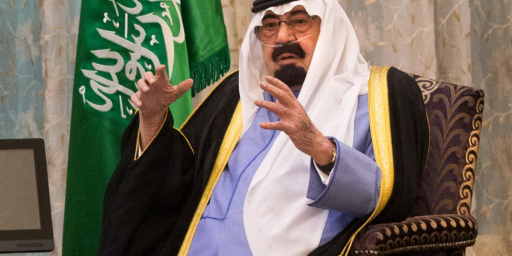
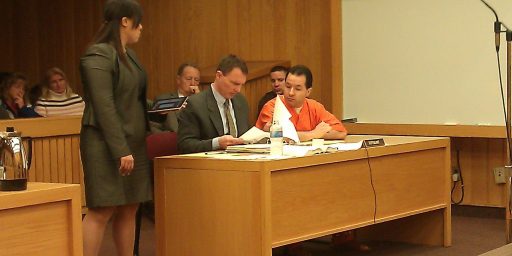
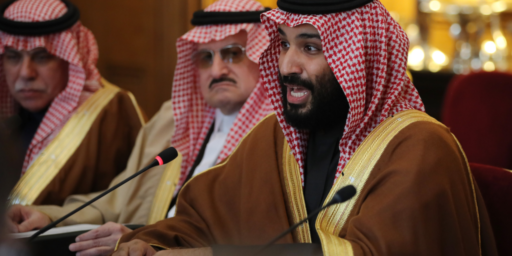
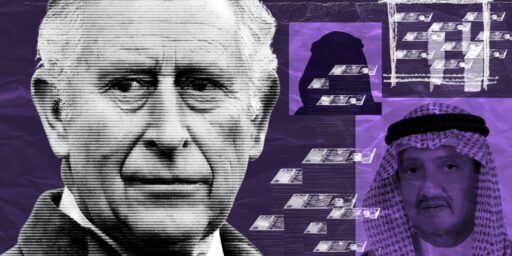
And that is all just one country. Just imagine the complex of interlocking businesses, estates, and portfolios that comprise the entire European web of family relationships that has been around since the Holy Roman Empire. Most of them keep their heads down but that doesn’t mean that don’t live very well indeed.
This is how one gets to grasp the penchant for decapitating royalty in European revolutions.
Mr. Baker described Charles as the most progressive, caring member of the royal family.
He doesn’t exactly have stiff competition for this honor. As far as his wealth goes, there is the slight sordid taint of the upper class being caught in the same offshore hustle as an Uzbeki playboy. And overall, there’s just a void at the heart of explaining what it is, exactly, the Royal Family does which requires such maintenance costs. Aside from showing up on time, reading a speech, not falling asleep, and then waving goodbye, what exactly is their function?
If the royals were ever going to matter it was during the Brexit battle. They did nothing. Britain was seriously harmed, the future of British children seriously constrained, there’s a non-zero chance the united part of United Kingdom isn’t going to survive, and the great rallying symbols did nothing.
Yes, I understand that they aren’t supposed to be meddling in politics. Got it. So, in a time of crisis their role is what, exactly? Debate the pronunciation of ‘scone’? What is this thing, being a symbol? That’s not a job, that’s the bullshit you try out on your boss when you’re just fucking off. “I’m the unifying symbol of the McDonald’s fryer station.”
King of England, job description: participate in meaningless rituals, wave from both cars and carriages, entertain the paparazzi. The man is as rich as Bezos, but Bezos delivers stuff and Charles does fuck-all.
I’m not sure how you are defining “unusual” here. There is nothing “usual” at all concerning the British Monarchy, because it is one of a kind. I guess you could legitimately say that everything they did was “usual” because there is nothing else to compare it to.
@Michael Reynolds: FWIW, I think Charles is a danger to the British Monarchy precisely because he feels the need to weigh in on weighty matters. His mother was smart enough to realize there is no upside for the Royals in ever taking sides on anything. Charles feels passionately about some things and I would guess he will have a hard time keeping himself from weighing in.
My feeling is that a lot of that so-called “property” in their portfolios is a bit of a poisoned chalice. They can’t be easily sold and the upkeep costs must be substantial even if they don’t have to pay taxes on the property. British weather + old houses == money pit.
(Like the Queen Anne near where I live–beautiful, but with a $41k annual tax bill attached.)
@Michael Reynolds: I’m by no means a royalist but the argument is that, by standing apart from everyday politics, they can serve the Head of State role and the PM the Head of Government role whereas both those roles are filled by one person in a republic. That means there’s no reason not to fully hold the PM accountable, since there’s no pretense that criticism of that office is unpatriotic.
@MarkedMan: Sure. But, again, the royal family is basically just a fundraising arm for the government. They live high on the hog, to be sure, but most of the stuff they own isn’t truly owned by them.
I dunno. Doesn’t the part about Charles turning existing assets into more profitable ones combined with the tourist attraction-ness of it all suggest that the monarchy could be transformed even more into a business that could then pay taxes?
@James Joyner: I am going to agree that there is something to be said for an apolitical head of state function.
The UK buckles under a cost of living crisis, but let them eat cake, no? 60% of 60% of Billions in wealth would leave the next-generation Windsors with more than money than God, but such “belt tightening” isn’t befitting the monarchy.
Maybe “how royalty works” isn’t all it’s cracked up to be.
Eh, I don’t see much point in getting worked up about such things. If was a citizen of the UK then things might be different. UK citizens certainly don’t need me lecturing them about what they should or shouldn’t do.
@James Joyner: @Steven L. Taylor:
Yeah, yeah, apolitical head of state. And is the result exceptionally good government? Lots of countries have apolitical heads of state, they don’t all cost what this gang does. Israel pays their president $173,000 a year. New Zealand’s HoS pulls down $260,000. Which seems unfair – New Zealand is not nearly as much work as Israel.
@Steven L. Taylor:
It would be, legally, paying taxes to itself.
@Steven L. Taylor: I see the relationship of the royals to the UK government much like I see the football teams at Alabama and Texas to their universities. They’re all essentially branding and entertainment vehicles that raise vast amounts of money, large sums of which are rolled back into the enterprise but which still leave enough over for there to be quite a bit of profit. The Duchy of Cornwall raises tons of money, which it uses to susidize the lavish lifestyle of the top royals, but it’s ultimately only nominally the property of the royals. Parliament could seize it if they so desired.
@Michael Reynolds: I’m pretty sure the Windsors bring in vastly more to the Exchequer than they take out. But, given the finances at their disposal, I don’t think it would be unreasonable to have them be totally self-sustaining. I don’t think Charles needs a salary on top of his massive estate.
@Steven L. Taylor:
The same could be said for American universities, at least the elite, heavily cash endowed ones.
But who readily gives up the liberty most infringed, that to keep and use what you earn to participate in markets and enterprise to generate wealth for yourself and family? Taxation is the first infringement.
From laissez faire capitalism ->interventionism ->various forms of socialism (really feudalism by committee) -> to the total bureaucratic control of the economy socialism we call communism are all increasing infringement on the right to keep and use your earnings. Mostly, the spectrum as it progresses limits the unconnected workers while privileging the officeholders and cronies. Interestingly, before the Soviet Union collapsed, we saw important and profitable government offices being passed down through families, with sons following fathers.
But being exempt from taxes is, as universities know, one of the best ways to generate wealth quickly since your net returns go up 10, 20, 40, even 60% in some cases.
@James Joyner:
Point is: it’s was not his.
It was not his private property.
He could not dispose of it freely, or even use it’s revenue at will.
Note I use the past tense.
Because all of this will now pass to Prince William.
But under the same constraints.
(Charles could not, for instance, have passed any part of it on to Harry, or to anyone else)
IMO having the Price of Wales/Duke of Cornwall pay taxes on the estates is about as absurd as having the President of the US pay rent to the US for residence in the White House out of his US salary.
@Michael Reynolds:
New Zealand’s Head of State doesn’t.
Because New Zealand’s head of state, as of now is…
King Charles III
Formally, the Governor General is only a stand-in for the Monarch.
@Michael Reynolds:
I’m as anti-Brexit as most anyone you’ll meet.
But for the monarch to step into that shitstorm would have been a disaster.
I cant think of any rational Remainers who called for or expected such an intervention.
Non executive heads of state simply DO NOT do that sort of thing.
Can you think of any similar intervention by any Western non-executive head of state, whether elected or hereditary?
I can’t, offhand.
@Michael Reynolds:
While that’s certainly true, I understand that Nicola Sturgeon, at least, favors retaining the monarchy for Scotland. So Charles would be King Charles the something of Scotland and separately King Charles III of England, Wales, and Northern Ireland. Seems kind of screwy to me, but I seem to recall lots of European precedents for arrangements like that.
The thing is, thee are several types of royal “property” that are getting confused here.
There is straight up “government property”: which is, because the country is a monarchy, technically property of the crown. But really isn’t.
There are the Crown Estates, managed by the Crown Estate Commissioners Board. These are technically property of the monarch but, in a odd way legally: ‘in right of The Crown’
Owned by the monarch by virtue of their accession to the throne. It is not the private property of the monarch – it cannot be sold by the monarch, nor do revenues from it belong to the monarch.
All profits go direct to the Treasury, so taxing them would be plain silly.
Then there are the Cornwall Estates: similar to the Crown Estate, but under the direct control of the heir, but only so long as he or she is heir.
Again, they cannot be disposed of, and automatically pass on when heir becomes monarch.
Revenues are rather more freely disposable; but within constraints.
They pay a “voluntary contribution” to the Exchequer on profits.
(There is also the Duchy of Lancaster, and the Scottish Estates, but life’s too short: they’re similar)
And finally: royal private property. Probably not much, comparatively.
Estimates of a few tens of millions in investments, and the Sandringham and Balmoral estates, and the private (not Crown or Royal LOL) art collections.
These are personal property, which can be disposed of and used at will.
Apparently taxes are paid, again formally as “voluntary donations”
But hard information on the details is rather sketchy.
@Michael Reynolds: You are conflating issues. I did not endorse a monarchy of this nature. I simply noted the value of an apolitical head of state.
And let me agree with @JohnSF that direct intervention into politics by the monarch would have been disastrous (and to note he is right about who the head of state is of various commonwealth countries).
@Steven L. Taylor: Historically, one paid taxes to the King, so it would be strange for the King to pay taxes to Himself.
Personally, I tend to think of the Royals as well-compensated Disney cast members. Some people can be jealous of that level of compensation, but when you consider they can’t really resign, their every move is scrutinized 24/7/365, and the security detail isn’t just for show, I’m not sure how great a deal it is.
@Han:
Except that the modern British state is more than the King.
@Steven L. Taylor: Well, yes, but, isn’t that all of a piece with the idea that the crown retains a number of powers, so long as they don’t use them? Legislation requires their assent, they appoint the prime mister, and request they form a government. And it is His Majesty’s Government, not The People’s. That’s why I tend to think of them as Disney cast members. Mickey Mouse isn’t going to pay rent to live at Disneyland.
There are good practical reasons for the king being very wealthy. It identifies his superior social status. This requirement can be traced back to the days of King Arthur, as colorfully explained in the excellent documentary by M Python:
@Han: Let me put it this way, because it is my main point, not the question of taxation: there is no particular reason that monarchy has to be maintained the way that it currently is.
A more modest monarchy could serve the same function (see, e.g., ,the Emperor of Japan).
I would be curious as to the relative amount of maintenance and wealth afforded to broader royal families in places like Spain, the Netherlands, Belgium, etc.
@Steven L. Taylor:
“…relative amount of maintenance and wealth afforded….”
Considerably less.
(At least in Europe; I know very little about the system in Japan.)
Other European are “civic” monarchies under a constitutional system.
The UK is not.
Ours is the last “anointed and coronated” mode monarchy still operating.
One of the reasons for not messing about with it, is that it could open up lots of other questions about other massive holding of non-personal property and corpora: the City, Oxford and Cambridge universities, the Church of England, etc.
And then you’d get a Parliament funded monarchy where the new version of the Civil List would be an annual fun fest for publicity hungry backbenchers.
Ouch!
Plus, if you are going to have a monarchy, why get all quibbly about the fine print?
May as well flaunt it, baby! 😉
@Michael Reynolds:
New Zealand has the same HoS as Britain 🙂